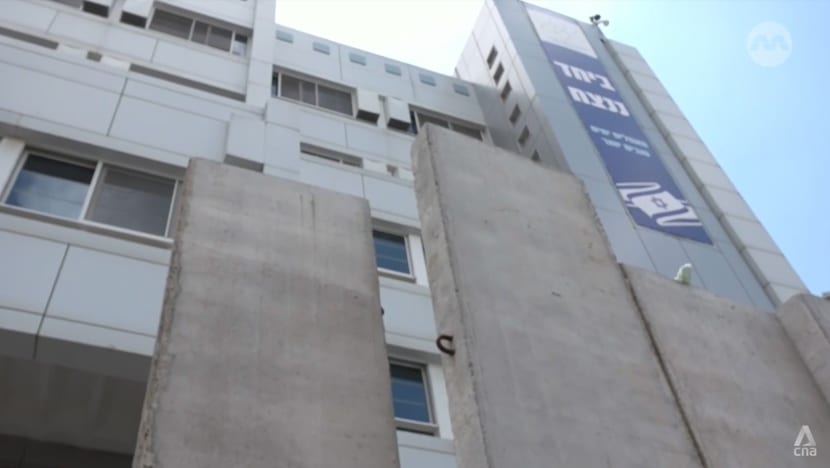Amid intensifying Israel-Lebanon cross-border violence, first responders prepare for the worst
In northern Israel, where more than 70,000 have already been displaced, first responders are stepping up preparations for a mass casualty scenario.


This audio is generated by an AI tool.
ISRAEL: Since the war in Gaza broke out nine months ago, Israel and Lebanese militant group Hezbollah have been engaged in increasingly hostile tit-for-tat cross-border fire.
Deadly violence along Israel’s northern border with Lebanon has sparked fears of a wider regional conflict.
In past months, thousands of rockets and drones have been fired into Israeli territory. Israel has also conducted strikes on southern Lebanon, killing three senior Hezbollah commanders.
In northern Israel, where more than 70,000 have already been displaced, first responders are stepping up preparations for the worst.
At the Galilee Medical Center, physicians told CNA they are ready for a mass casualty scenario.
The emergency facility, which is the second-largest hospital in northern Israel, has been operating in war mode since the Gaza war broke out in October last year.
The hospital has a blast-proof bunker deep underground built with reinforced concrete and blast doors.
A few months ago, the Israeli military further fortified its exterior with a large concrete wall. It is meant to protect the hospital’s helicopter in the event of rocket or sniper fire from Lebanon, about 10km away.
The hospital’s chief of critical care Dr Uriel Trahtemberg, said: “We’ve made plans … and we could reach almost 60 critical care beds if we get to a surge.”
Dr Trahtemberg added they can also tap other hospitals in the area for more personnel to help.

WAR PLAN IN LEBANON APPROVED
Hezbollah, which is backed by Iran and allied with Palestinian militant group Hamas, once fought a vicious 34-day war with Israel almost two decades ago – something neither side is likely eager to repeat.
But last month, the Israeli military approved a war plan for an offensive in Lebanon.
Hezbollah leader Hassan Nasrallah is threatening to raze Israel in the event of a full-scale conflict, saying there would be “no restraint and no rules and no ceilings” if Israel launches a major attack.
On the other hand, another Hezbollah commander, Sheikh Naim Kassem, has reiterated the group’s long-held position that it would stop fighting “without any discussion” if a full ceasefire is reached in Gaza.
Israel has said it prefers a diplomatic solution.
But even so, Israel Defense Forces (IDF) troops and tanks have been moved to the northern border.
If Israel were to move ahead with an offensive, questions have emerged over its capacity for such a major military undertaking – especially as Hezbollah is much more heavily armed than Hamas.
There are also fears about the role Iran would play with the armed groups that it supports in the region.
Related:
HEZBOLLAH’S FORMIDABILITY
While some Western officials have downplayed Hezbollah’s formidability as a paramilitary force, those on the ground told CNA they feel the opposite.
“The rockets and missiles of Hezbollah can reach almost everywhere in Israel,” said IDF Lieutenant-Colonel (Reserve) Sarit Zehavi, who founded non-profit Alma Research and Education Center. It researches security challenges on Israel’s northern borders.
She added: “Of course, we have the Iron Dome but the amounts would be huge and we understand that the Iron Dome would not be enough.”
Israel’s Iron Dome air defence system was created to cope with mortars and rockets shot into Israel at relatively close range.
Hezbollah also claims to have more than 100,000 battle-hardened soldiers who fought in the Syrian civil war.
“THE LAST FRONTIER”
For months, tens of thousands of residents on both sides of the Israel-Lebanon border have been under evacuation orders.
But in Israel, some soldiers from towns that dot the northern ridge have stayed put to guard the border line as part of an emergency squad.
Some IDF officials, who declined to give their full names as a precaution, said the border line is a strategic frontline for both sides.
“This is actually the last frontier,” said Omri, a first responder commander from the IDF reserves.
In the meantime, amid fears that any kind of miscalculation from either side could ignite this tinderbox region, more countries have been calling on their citizens to leave Lebanon while commercial flights are still available.
Foreign mediators have been desperately seeking a diplomatic solution to try and stop the crisis from escalating into a full-scale regional war.
At a press briefing last month, United States’ Department of State representative Matthew Miller said the US thinks a diplomatic resolution “is possible”.
“We’re going to continue to pursue that because it’s in the interests of all the parties involved, and most importantly, in the interests of the tens of thousands of Israeli and Lebanese families who have been displaced from their homes and want to be able to return home,” he added.














